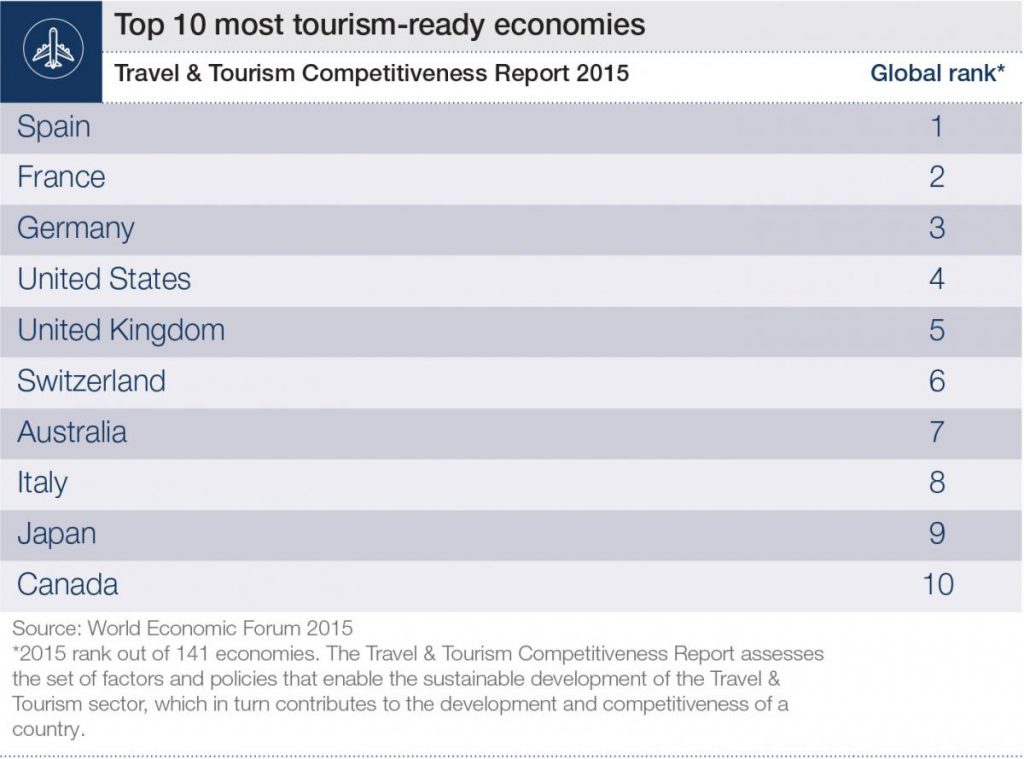Spain leads 2015 Travel and Tourism Competitiveness Index

Davos : Spain leads the World Economic Forum’s 2015 Travel and Tourism Competitiveness Index. It is the first time the country has ranked top of the biennial report – published under the theme Growing through Shocks – and is a positive sign for the country’s nascent recovery.
The Travel and Tourism Competitiveness Report ranks 141 countries across 14 separate dimensions, revealing how well countries could deliver sustainable economic and societal benefits through their travel and tourism sector. Spain’s leadership position is helped by a world class ranking in cultural resources (1st globally), its ability to support online searches for entertainment (4th) – a measure of how well the country has adapted to consumption habits brought on by the digital revolution – as well as excellent infrastructure (4th).
Traditional strong travel and tourism destinations such as France, Germany, the United States, the United Kingdom, Switzerland, Australia, Italy, Japan and Canada complete the top 10. Of the large emerging markets, China (17th) and Brazil (28th) made it into the top 30, whereas Russia, South Africa and India ranked 45th, 48th and 52nd, respectively. While this made Brazil and South Africa the best placed in their region, Singapore (11th) came up top in South-East Asia, and the United Arab Emirates (24th) was the highest placed nation in the Middle East and North Africa.
The diversity in the top 30 shows that a country does not have to be wealthy to have a flourishing tourism sector, said Roberto Crotti, Economist at the World Economic Forum. But many countries should still do more to tackle travel and tourism challenges, including visa policies, better promotion of cultural heritage, environmental protection and ICT readiness. This in turn would drive economic growth and the creation of jobs.
The report also identifies areas where tourism-oriented economies could do better in adapting to changing global trends as well as growing market segments. These include a growing number of middle class travellers from emerging and developing countries, senior consumers and millennials. It also finds a need for travel-reliant economies to adapt faster to online services and marketing, as mobile internet continues to define the way travellers select, plan and review their trips.
The global travel and tourism sector, which already accounts for almost one-tenth of global GDP, grew at an average of 3.4% per year over the past four. This compares favourably with the global economy, which grew at only 2.3% per year, indicating the sector’s resilience to economic shocks. In the coming five years, growth in the sector could accelerate to 5.2% per year, according to the World Travel & Tourism Council.
According to Xinhua , China has jumped to 17th position in the 2015 global travel and tourism competitiveness, according to the World Economic Forum’s 2015 Travel and Tourism Competitiveness Index, a biennial report published earlier this month.
When the index was first released in 2007, China was at the 71st place. The country’s natural and cultural resources and the price competitiveness have helped it to gain 28 places in comparison with 2013 to the 17th position in the rankings this year.
China so far has 47 items listed on the UNESCO’s world heritage list, second only to Italy in the world. The study also recognized China’s achievements on the construction of infrastructure, the rise of the creative industry and the ability to host international events.- Agencies
May 2015















